|
|
|
Sort Order |
|
|
|
Items / Page
|
|
|
|
|
|
|
| Srl | Item |
| 1 |
ID:
140414
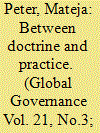

|
|
|
|
|
| Summary/Abstract |
Mandates of recent peacekeeping operations across Africa have shown substantial innovation in the thinking of the UN Security Council. Offensive use of force, use of unmanned aerial vehicles, strategic intelligence and communication, and state-building mandates in the midst of conflicts have all expanded the scope of activities beyond what the UN peacekeepers are accustomed to. The UN is entering a new era of enforcement peacekeeping. Enforcement peacekeeping manifests itself both in enforcement of political solutions through support of a government's state-building ambitions and its attempts to extend state authority in the midst of conflict and in enforcement of military victories through the offensive use of force. These developments further unsettle the basic principles of UN peacekeeping—consent, impartiality, and nonuse of force—resulting in a schism between the doctrine and practice. This contribution argues that such fundamental challenges, when not properly acknowledged, create a wall between operational activities and strategic considerations. They preclude a proper debate on the problematic externalities, in particular on political processes and peacebuilding.
|
|
|
|
|
|
|
|
|
|
|
|
|
|
|
|
| 2 |
ID:
115434
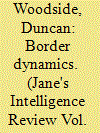

|
|
|
| 3 |
ID:
097750
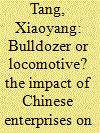

|
|
|
|
|
| Publication |
2010.
|
| Summary/Abstract |
This article is to analyze the impact of Chinese enterprises on the local employment practices in Angola and the Democratic Republic of the Congo (DRC). Based on surveys of over 100 Chinese and local companies and extensive interviews with managers and policy-makers in both countries made from July to December 2007, the study aims not only to depict the current employment practices of Chinese companies in Africa, but also to analyze the factors which affect the localization of employment. Two major patterns, bulldozer-type and locomotive-type, are identified and their implications for the local communities are discussed.
|
|
|
|
|
|
|
|
|
|
|
|
|
|
|
|
| 4 |
ID:
127041
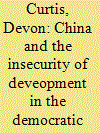

|
|
|
|
|
| Publication |
2013.
|
| Summary/Abstract |
This article analyses China's contemporary engagement in the Democratic Republic of the Congo (DRC) as an example of Chinese involvement in a resource-rich, conflict-affected country. Following a large 'minerals for infrastructure' agreement signed in 2008, China's activities in the DRC are often presented as an example of a departure from Western-led liberal peacebuilding and development, by providing 'corrupt' Congolese national elites with new sources of unchecked rents; or it is viewed as a positive alternative to Western approaches, by focusing on win-win development and reconstruction. Both these views are flawed. Rather than offering a marked alternative to a Western 'liberal' peacebuilding project, this article argues that Chinese interests have increasingly coincided with evolving Western interests in support of stabilization and market-driven economic activities. This, however, does not offer a clear pathway to security and development in the DRC. On the contrary, both Chinese and Western involvement in the DRC provide possibilities for continued insecurity, rather than any fundamental break from previous patterns and structures of politics.
|
|
|
|
|
|
|
|
|
|
|
|
|
|
|
|
| 5 |
ID:
131863


|
|
|
|
|
| Publication |
2014.
|
| Summary/Abstract |
THERE HAS BEEN no stable peace for a long time now in the Democratic Republic of the Congo (DRC or DR Congo), the key Central African country. Latent war in its eastern provinces has been going on for longer than one decade wiping off its democratic achievements and impeding the country's development. Arbitrary actions of the military, mass rapes, tortures, and the turning into slaves of young children and teenagers make thousands of people abandon their homes and flee for safety.1
|
|
|
|
|
|
|
|
|
|
|
|
|
|
|
|
| 6 |
ID:
097658
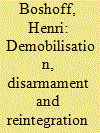

|
|
|
|
|
| Publication |
2009.
|
| Summary/Abstract |
This article surveys disarmament, demobilization and reintegration (DDR) efforts in the Democratic Republic of Congo (DRC), focusing on initiatives by the Forces Démocratiques pour la Libération du Rwanda (FDLR) and the Congrès National pour la Défense du Peuple (CNDP).
|
|
|
|
|
|
|
|
|
|
|
|
|
|
|
|
| 7 |
ID:
088107
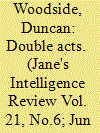

|
|
|
|
|
| Publication |
2009.
|
| Summary/Abstract |
The democratic republic of Congo has shown a willingness for rapprochement with its traditional enemies, Uganda and Rwanda,
by joining them in two operations targeting rebels in the Great Lakes.
|
|
|
|
|
|
|
|
|
|
|
|
|
|
|
|
| 8 |
ID:
087832
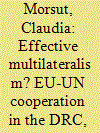

|
|
|
|
|
| Publication |
2009.
|
| Summary/Abstract |
This article examines the EU's partnership with the UN in building effective multilateralism through an analysis of the EU operations in the Democratic Republic of Congo (DRC) between 2003 and 2006. The EU has offered a range of tools in the field of civilian and military crisis management to MONUC, the UN Organization Mission in the DRC, thus representing the first case of full partnership on the ground between the two organizations. This pioneering peace operation can offer insights into possible future collaboration between the two organizations in peace and security matters. The argument of the article is that it is possible to establish a 'partner model' from the example of cooperation in the DRC: in the case of a UN deficit, the EU may intervene as supporting organization. However, since the EU is keen to be considered as an independent global actor, it seems focused on a pragmatic rather than institutionalized approach in its cooperation with the UN.
|
|
|
|
|
|
|
|
|
|
|
|
|
|
|
|
| 9 |
ID:
154481
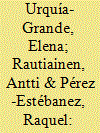

|
|
|
|
|
| Summary/Abstract |
The Democratic Republic of Congo (DRC) is a country with high natural resources, but it has suffered from decades of civil wars and social turmoil, being heavily aid-dependent. In the DRC, several Nonprofit Organisations (NPOs) are major players in fighting poverty and enhancing welfare. This research aims to analyse the effectiveness of small NPOs in improving poor peoples’ lives through health, education, and economic activities. Two NPOs working in the DRC, one in a rural and the other in an urban area, are compared by researching the aid sites and surveying 201 households (aid beneficiaries). Our case observations and the survey results facilitate analysing the mission accomplishment, effectiveness, and accountability of the NPOs although we admit that the DRC conditions make exact measurements difficult. Multivariate analyses are used to study the differences in aid impacts. There are significant differences in the beneficiaries’ perception of the NPO effectiveness in improving health while no significant differences in education impact were found. This is probably because both case NPOs have succeeded in getting a large proportion of the children of their area registered in the education centres created by the NPOs. Differences were observed in the accountability and reporting style of the NPOs.
|
|
|
|
|
|
|
|
|
|
|
|
|
|
|
|
| 10 |
ID:
129439
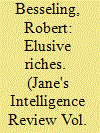

|
|
|
| 11 |
ID:
123048
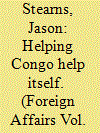

|
|
|
|
|
| Publication |
2013.
|
| Summary/Abstract |
It would be easy to label the Democratic Republic of the Congo an irredeemable mess. For almost two decades, the country has been roiled by a series of wars involving neighboring countries and dozens of Congolese militias. Recent years seemed to bring some respite; in 2009, following a peace deal between the Congolese and the Rwandan governments, some of the main armed groups in eastern Congo joined the national government. But this agreement, like previous ones, soon succumbed to its flaws. Since April 2012, violence has once again begun to escalate, centered on a new rebellion in the eastern highlands led by the March 23 Movement, or the M23 (the group takes its name from the date of the signing of the 2009 peace accord, which it contends the government has not respected). There are now 2.6 million people displaced in Congo, over 30 different armed groups, and thousands of killings and rapes each year. The UN has deployed one of its largest peacekeeping missions there, and half a dozen peace processes and agreements have failed to bring an end to the fighting.
|
|
|
|
|
|
|
|
|
|
|
|
|
|
|
|
| 12 |
ID:
165112
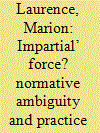

|
|
|
|
|
| Summary/Abstract |
Impartiality is a core legitimating norm for United Nations peace operations. Yet beliefs about what that norm requires of UN personnel have shifted dramatically. In 2013, for example, the Security Council created an intervention brigade – composed of infantry battalions, special forces, and an artillery company – to ‘neutralize’ non-state armed groups in the Democratic Republic of the Congo (DRC). According to critics, these activities violate core peacekeeping norms, including impartiality. This criticism elicits a puzzling response from many UN officials. They downplay the novelty of new practices, insisting that they are still ‘impartial’. Where does this discursive pattern come from, and what does it tell us about the relationship between day-to-day practices and the norms that ostensibly guide UN peace operations? Drawing on evidence from the DRC, I argue that norms like impartiality may endure – and remain rhetorically powerful – without telling us much about how practices on the ground have evolved. Instead, insisting that new practices are impartial can be a way for UN personnel to stabilize a core part of their identity under conditions of normative ambiguity. It can also be a way of glossing over contestation and pre-empting concerns about partiality in UN peace operations.
|
|
|
|
|
|
|
|
|
|
|
|
|
|
|
|
| 13 |
ID:
117394
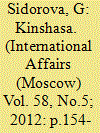

|
|
|
|
|
| Publication |
2012.
|
| Summary/Abstract |
THE OUTLINE of the DRC's contemporary foreign policy began to take shape with the end of the civil war (1998-2003) in the midst of a political and military crisis. To rehabilitate the national image and regain credibility on the international scene was not easy. The country had a large external debt (approximately $14 billion), lost its voting rights in the African Union (because of unpaid membership dues), and was poorly represented and passive in international organizations. During the transition period (2003-2005), the leadership's efforts were mainly to restore the devastated economy and lay the foundations of a democratic state. But instability on the eastern borders of the DRC, where disparate forces still fought each other, hampered those efforts.
|
|
|
|
|
|
|
|
|
|
|
|
|
|
|
|
| 14 |
ID:
103674
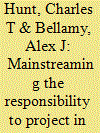

|
|
|
| 15 |
ID:
082099


|
|
|
|
|
| Publication |
2008.
|
| Summary/Abstract |
During the last years the DRC has made itself known in the world for terrible acts of violence committed by armed men - militia and the regular army - against the civilian population. The voices of the soldiers and combatants have so far been absent in the accounts of this violence. This silence is problematic, both because it makes it harder to understand such violence, but also because it reinforces stereotypes of African warriors as primitive and anarchic, driven by innate violence and tribal hatred. Enquiry into the particular discursive as well as material circumstances of the armed conflict in the DRC, which might better redress the complex and interrelated context in which 'people in uniforms' commit violence, is consequently impeded. The story we recount here emerges from soldiers within the main perpetrator of violence in the DRC today: the Integrated Armed Forces. The soldiers' interview texts challenge the dominant representation of soldiers and combatants in the DRC. The soldiers made sense of the prevalence of violence (in which they too had participated) in several interrelated ways, none of which reflected any expression of 'natural' (if dormant) violent tendencies, hatred or vengefulness for the enemy.
|
|
|
|
|
|
|
|
|
|
|
|
|
|
|
|
| 16 |
ID:
127078
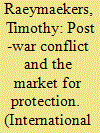

|
|
|
|
|
| Publication |
2013.
|
| Summary/Abstract |
This article seeks to deepen the debate about violent war-to-peace transitions through a comparative case study between two rebel movements that became integrated in considerably different ways in post-war Democratic Republic of Congo (DRC). The political marketplace brought about by Congo's war-to-peace transition substantially influenced the bargaining power of non-state armed actors in the country's eastern borderlands. In such violent environments, non-state actors like militias, try to become recognized as alternative taxing authorities opposed to state governments, while they simultaneously collaborate with them to gain access to the dividends of international peacebuilding efforts. A decisive factor for the legitimacy of these violent agencies is their ability to transform from coercion- to capital-based organizations: militias, like state governments, need to actively organize local production while embedding their authority in rapidly transforming idioms of political power. This article argues that the 'symbiotic' relationships emerging between rebel rulers, capitalist brokers and state government in the context of protracted armed conflict have far-reaching consequences for the political order of post-war states, with varying results depending on the coercion- and capital-based rule of these emerging complexes in the world's violent peripheries.
|
|
|
|
|
|
|
|
|
|
|
|
|
|
|
|
| 17 |
ID:
135230
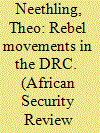

|
|
|
|
|
| Summary/Abstract |
Despite a generally valiant effort on the part of the United Nations (UN) since 1999 to bring peace and stability to the Democratic Republic of the Congo (DRC), the country continues to be destabilised by rebel forces. These armed movements pose a constant threat to the fragile transition in the DRC, and security in the country is continuously undermined. This article examines rebel forces in the DRC from two perspectives. Firstly, it examines such movements as a manifestation of sub-national terrorism. Secondly, it examines armed movements from the perspective of so-called ‘ungoverned spaces’. The view taken in this article supports the scholarly insight and argument that in countries such as the DRC, armed movements and militias are filling power vacuums that are the result of the inability and lack of military capacity of weak states to fight these movements effectively. Specifically, the eastern and north-eastern parts of the DRC have been major conflict zones where sub-national terrorists employ terror as a strategy. In this context, the DRC is severely affected by terrorism – a phenomenon in the DRC that is intimately linked to the failure to effect sustained development and to consolidate accountable and effective governance.
|
|
|
|
|
|
|
|
|
|
|
|
|
|
|
|
| 18 |
ID:
097769


|
|
|
|
|
| Publication |
2010.
|
| Summary/Abstract |
The collapse of Mobutu's Zaire and the arrival of father and son Kabila regimes in the Democratic Republic of the Congo (hereafter, the DRC) were hastened by the dramatic and tumultuous spread of violence from neighboring Rwanda. Mobutu's state's inability to manage the influx of Hutu refugees (with Interahamwe militia members interspersed) into the Kivu province of eastern Zaire from Rwanda's bloody genocide of 1994 or to compensate for the ratcheting up of their cross-border skirmishes with the Banyamulenge (Zairean Tutsi) population in 1996, exacerbated extant tensions and has since resulted in more than a dozen years of civil war. This example prompts us to ask: are countries with higher levels of state capacity better able to resist the spread of violence from neighboring territories into their own? The author argues that when falsely divided notions of spatial heterogeneity and dependence are interacted, contagion from neighboring conflicts becomes a risk of diminishing value for increasingly capable states. A model of civil war contagion affirms a conditional hypothesis, showing that state capacity modifies the likelihood that a state will become infected by a civil conflict occurring in neighboring territories.
|
|
|
|
|
|
|
|
|
|
|
|
|
|
|
|
| 19 |
ID:
098127
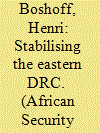

|
|
|
| 20 |
ID:
155202
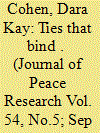

|
|
|
|
|
| Summary/Abstract |
How do armed groups use violence to create social ties? What are the conditions under which such violence takes place? In this article, I describe how armed groups use one type of atrocity, wartime rape, to create social bonds between fighters through a process of combatant socialization. As a form of stigmatizing, public, and sexualized violence, gang rape is an effective method to communicate norms of masculinity, virility, brutality, and loyalty between fighters. Drawing on literature about socialization processes, I derive a set of hypotheses about individual-level factors that may influence vulnerability to violent socialization, including age, previous socialization experiences, and physical security. I analyze the support for these hypotheses using newly available survey data from former fighters in the Democratic Republic of the Congo. The results show the broad applicability of considering group violence as a form of social control within armed groups, suggest some of the limits of violent socialization, and have implications for both theory and policy.
|
|
|
|
|
|
|
|
|
|
|
|
|
|
|
|
|
|
|
|
|